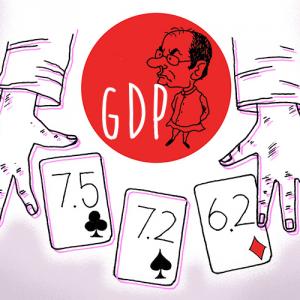The financial year ending Saturday saw such big-ticket events that set the directional tone for the country’s business journey.
Illustration: Uttam Ghosh/Rediff.com.

Beyond the hoopla on buoyant markets, the big bank scam at Punjab National Bank, the roll-out of the goods and services tax, leadership changes at two of the country’s respected companies, Infosys and the Tata group, the bloodbath in the telecom sector, and some known companies going belly-up, the last financial year saw such big-ticket events that set the directional tone for the country’s business journey.
Having launched in 2016, and established its strategy of free voice services to ratchet up market share Reliance Jio Infocomm, the 800-pound gorilla in the telecom room saw the past year grow in market share, establish content as the king of it all and disrupt a major industry like never before.
Jio, a $31-billion venture also created more of a surprise earlier this year by reporting a net profit of Rs 5.04 billion for the December 2017 quarter against a loss of Rs 2.71 billion in the previous one.
Jio, with a subscriber base of 160 million users and growing fast, has impacted other telecom players. Most players have lost market share and have suffered losses, while Vodafone and Idea are merging in an effort to maintain business.
Even as the telecom slugfest played out, N Chandrasekaran completed one year as the new chairman of the $100-billion Tata group. He took stock of legacy issues of the group companies that included resolving the $1.2-billion legal issue with NTT DoCoMo, and allowed for the Japanese to exit Tata Teleservices and merged the mobile services business with Bharti Airtel.
Next was the merger of Tata Steel’s European business with German player ThyssenKrupp, followed by a Rs 128-billion rights offer to existing shareholders which part-funded the Kalinganagar plant expansion.
Tata Motors, whose domestic market share had dipped, saw incremental increases of 1 per cent in passenger vehicles and 2.5 per cent for commercial vehicles, and the company showed profits in the standalone business for the first time in over a year.
Other moves led to the combined value of 22 listed Tata entities to grow Rs 1.45 trillion in 2017-18, with companies such as TCS, Titan, Tata Chemicals and others outperforming indices.
Chandra, as he’s known, also brought in a new deck of leaders that included Saurabh Agrawal as group chief financial officer, Aarthi Subramanian as chief digital officer, Puneet Chhatwal as managing director and CEO of Indian Hotels, Rajiv Sabharwal at Tata Capital, Banmali Agrawala as president of infrastructure and defence and aerospace vertical, and Sanjay Dutt as CEO of Tata Housing.
Infosys, long seen as the bellwether of Indian IT, was unable to reinvent itself after a decade of growing at a slower pace under different bosses, that mostly included founder team members.
So when Vishal Sikka the first non-founder CEO brought in stability to the company, it was seen as a positive.
But, not everyone felt the same way and founder Narayana Murthy’s questioning of a few of the company’s issues, Sikka’s exit and Nandan Nilekani’s return point to a dualistic challenge that founders face: Succession planning and dealing with external CEOs who run the company, after they have stepped down.
Anil Singhvi, chairman Ican Investment Advisors, says, “India Inc suffers from the malady of not letting good professionals run corporations. The flip side is that boards are not strong enough, then often the CEO becomes larger-than-life and that’s something that Infosys suffered on both counts.”
With all the talk about non-performing companies and a pile-up of debt across steel, cement and power sectors, the Insolvency and Bankruptcy Code, introduced in 2016 as the bankruptcy law of India, aimed to consolidate the existing framework by creating a single law for insolvency and bankruptcy.
In principle, the law set a precedent for a massive clean-up that purported existing players who were solvent to bid for assets on the block, thereby salvaging industry players as well as restoring sick companies.
In practice, however, the process has been less-than-optimum, with bidders getting into finger-pointing on the transparency of bidding, resolution professionals coming under fire for allegedly being unfair and the fate of assets such as Binani Cement potentially being locked into legal tussles despite the objective to get them out of the woods.
For example, UltraTech came from left-field when it offered to buy a 98 per cent of the promoter stake of Binani Cement. The Aditya Birla Group had contested the decision of the Committee of Creditors to sell Binani Cement to Dalmia Bharat.
Then, in the case of Ruia-promoted Essar Steel, bidders, Numetal and ArcelorMittal, were rejected by the CoC as wilful defaulters and defaulting promoters were barred from offering a resolution plan.
In another instance, a resolution professional rejected UK-based Liberty House’s bid for Bhushan Power and Steel on the basis that its submission came late.
“The IBC was really needed, and is essentially a commercial remedy for the ill-effects that crept into companies, and the idea was pure in its origin,” Singhvi says.
Today, he says, "The process has become legalistic when the idea was to find a commercial resolution quickly and not let already beleaguered assets continue to suffer.”
The GST, expected to be a tax-simplifier, went into effect last year in July and proved to be one of the more complex with five different slabs, and non-exemption of duties on real estate, petroleum products and electricity.
Measures to reduce the number of GST slabs are underway, officials said. While the adjustment process hindered commerce for a while, experts say the benefits of the GST are likely to kick in, in the long run.










